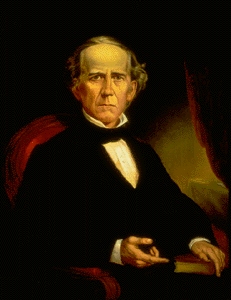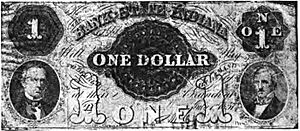Joseph A. Wright facts for kids
Quick facts for kids
Joseph Albert Wright
|
|
|---|---|
 |
|
| United States Senator from Indiana |
|
| In office February 24, 1862 – January 14, 1863 |
|
| Appointed by | Oliver P. Morton |
| Preceded by | Jesse D. Bright |
| Succeeded by | David Turpie |
| United States Envoy Extraordinary and Minister Plenipotentiary to Prussia | |
| In office September 3, 1865 – May 11, 1867 |
|
| President | Andrew Johnson |
| Preceded by | Norman B. Judd |
| Succeeded by | George Bancroft |
| In office September 3, 1857 – July 1, 1861 |
|
| President | James Buchanan |
| Preceded by | Peter Dumont Vroom |
| Succeeded by | Norman B. Judd |
| 10th Governor of Indiana | |
| In office December 5, 1849 – January 12, 1857 |
|
| Lieutenant | James H. Lane Ashbel P. Willard |
| Preceded by | Paris C. Dunning |
| Succeeded by | Ashbel P. Willard |
| Member of the U.S. House of Representatives from Indiana's 7th district |
|
| In office March 4, 1843 – March 3, 1845 |
|
| Preceded by | Henry S. Lane |
| Succeeded by | Edward W. McGaughey |
| Member of the Indiana House of Representatives |
|
| In office 1832 |
|
| Personal details | |
| Born |
Joseph Albert Wright
April 17, 1810 Washington, Pennsylvania |
| Died | May 11, 1867 (aged 57) Berlin, Prussia |
| Political party | Democratic |
| Spouses |
Louisa Cook
(m. 1831; died 1852)Harriet Burbridge
(m. 1854; died 1855)Caroline Rockwell
(m. 1863) |
| Children | 4 |
| Alma mater | Indiana University Bloomington |
Joseph Albert Wright (born April 17, 1810 – died May 11, 1867) was an important political figure from Indiana. He served as the tenth governor of Indiana from 1849 to 1857. He was known for his strong opinions, especially about banks. Later, he became a United States Senator and an ambassador to Prussia.
Contents
Joseph A. Wright: Indiana's 10th Governor
Early Life and Education
Family and School Days
Joseph Albert Wright was born in Washington, Pennsylvania, on April 17, 1810. When he was ten, his family moved to Bloomington, Indiana. His father was a bricklayer and helped build the first buildings of Indiana State Seminary (now Indiana University). Joseph's father passed away when Joseph was only fourteen. This made his family very poor. To help out, Joseph worked as a janitor and bell ringer. He even laid bricks sometimes, just like his father. These jobs helped him pay for his own schooling and support his family.
Becoming a Lawyer
Because he lived in Bloomington, Joseph could attend the seminary while staying at home. This made getting an education affordable for him. He learned Greek and Latin, which were important subjects back then. He graduated in 1828 and decided he wanted to become a lawyer. He studied law with a well-known judge named Craven Hester. By 1829, he was ready to practice law. He then moved to Rockville and opened his own law office. There, he met Louisa Cook, who he married in 1831. They had one son and adopted a daughter. Joseph became very involved in the Methodist Church and supported Sunday Schools. Many of his early political supporters came from his church.
Starting in Politics
First Steps in Government
In 1832, Joseph Wright was elected to the Indiana House of Representatives for Parke County. He served for one year. During this time, he supported a plan for the Bank of Indiana, which was not popular in his area. Because of this, he lost his next election. In 1836, he ran again and won a second term. He supported projects to improve Indiana, like building roads and canals.
After leaving the House, he worked as a prosecuting attorney in 1838. He didn't like the constant travel, so he resigned the next year. In 1839, he ran for the Indiana State Senate. This election was very competitive. Joseph won by a small number of votes.
Serving in Congress
In 1843, Joseph Wright ran for the United States House of Representatives and won by just three votes. While in Congress, he was against the spread of slavery. He believed in ending slavery gradually and helping freed slaves move to other places. He lost his re-election campaigns in 1845 and 1847.
In 1845, President James K. Polk appointed him as a special representative to Texas. He held this diplomatic job during the Mexican–American War until Texas joined the United States.
Governor of Indiana
Taking Office
In 1849, Joseph Wright was nominated to run for governor of Indiana. He was elected governor, winning by a good number of votes. He took office on December 5, 1849. During the same election, people also voted to hold a special meeting to create a new state constitution.
As governor, Wright had to sign an arrest warrant for a Methodist minister named Calvin Fairbank. Fairbank helped enslaved people escape from Kentucky using the Underground Railroad. Because of Wright's signature, Fairbank was taken to Kentucky and put in prison.
Family Life as Governor
Sadly, Joseph's first wife, Louisa, died in 1852 from malaria. He remarried in 1854 to Harriet Burbridge. They had twins, a son named Joseph Albert Jr. and a daughter named Harriet. But Harriet, his second wife, also passed away in October 1855, shortly after giving birth.
Big Changes for Indiana
During his time as governor, Indiana adopted its current constitution in 1851. Joseph Wright was a big supporter of this new constitution. He helped make sure it included tax reforms and better ways to manage state institutions. The new constitution also led to a major change in the state's school system in 1852. Wright helped set up school boards and tax collection for schools across Indiana. He also helped create the State Board of Education and the State Agricultural Board.
Joseph Wright was very passionate about farming. He created the State Board of Agriculture to help farmers in Indiana. One of its first big achievements was organizing the very first Indiana State Fair in 1851.
Standing Up to Banks
Joseph Wright was known for being strongly against banks. He believed that banks caused problems. The charter for the Bank of Indiana was going to end in 1857. Wright did not want the bank's charter to be extended, and he didn't want any new banks to open in the state either.
In 1851, he tried to stop a law called the Free Banking Act. This law would have allowed new banks to open in Indiana and ended the Bank of Indiana's special status. But the state legislature disagreed with him and passed the law anyway, overriding his veto.
In 1855, another bill was passed to let the Bank of Indiana become a private company. Governor Wright vetoed this bill too. But again, the legislature voted to pass it over his veto. Wright even gave a speech to the House of Representatives, accusing the bank of being dishonest. He tried to fight the bank in court, but the courts ruled against him.
Second Term and Challenges
Joseph Wright ran for governor again in 1852 under the new constitution. He won, serving a four-year term. Some people questioned if he could serve a second term because the new constitution said governors couldn't serve two terms in a row. But it was decided that since his first term was under the old constitution, he was allowed to run again.
Towards the end of his term, the Democratic Party in Indiana started to have disagreements, especially about slavery. A new political group, made up of different parties, formed. This made it harder for Wright to get things done in his last two years as governor.
Despite these challenges, Wright was popular with the public when he left office. He was a strong supporter of the Union (the northern states) during a time when the country was divided. He even had a stone sent for the Washington Monument with the words: "Indiana knows no East, no West, no North, no South; nothing but Union." This stone is still in the monument today.
A Leader During the Civil War
Serving as Ambassador
In 1857, President James Buchanan appointed Joseph Wright to be the Envoy Extraordinary and Minister Plenipotentiary to Prussia (a powerful German kingdom at the time). He served there until 1861. While he was away, the Democratic Party in Indiana officially removed him and others from the party.
Supporting the Union
When the American Civil War began in 1861, Joseph Wright was in Germany. He quickly returned home to Indiana and openly supported the Union cause.
In 1861, a letter was found from Senator Jesse D. Bright (who was a political rival of Wright's) offering advice to the leader of the Confederate States. Because of this, Senator Bright was removed from the Senate for being disloyal. Governor Oliver P. Morton then appointed Joseph Wright to take Bright's place as a United States Senator. Wright served from February 24, 1862, until a new senator was elected in January 1863.
Later Years and Legacy
In 1863, Joseph Wright married Caroline Rockwell. Soon after, President Abraham Lincoln reappointed him as the Ambassador to Prussia. Wright returned to Berlin in 1863 and stayed there until he passed away on May 11, 1867. His body was brought back to the United States and buried in New York City.
Today, a student housing building at Indiana University called the Wright Quadrangle is named after Joseph A. Wright.
Electoral history
| Party | Candidate | Votes | % | |
|---|---|---|---|---|
| Democratic | Joseph A. Wright | 76,996 | 52.3 | |
| Whig | John A. Matson | 67,218 | 45.6 | |
| Free Soil | James H. Cravens | 3,076 | 2.1 | |
| Party | Candidate | Votes | % | |
|---|---|---|---|---|
| Democratic | Joseph A. Wright (incumbent) | 95,576 | 55.4 | |
| Whig | Nicholas McCarty | 73,641 | 42.7 | |
| Free Soil | James H. Cravens | 3,308 | 1.9 | |
See also
Images for kids
 | Calvin Brent |
 | Walter T. Bailey |
 | Martha Cassell Thompson |
 | Alberta Jeannette Cassell |



